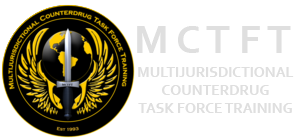Disturbing and unfortunate situations can arise during the most crucial time of a sting operation. This one hour training broadcast takes an in-depth look at how to avoid legal and life-threatening circumstances that can occur during drug sting operations. Trained professionals will focus on planning a successful operation, understanding the role of law enforcement officers and their informants and common legal issues.
Trained professionals will critique law enforcement surveillance footage and discuss how to plan a successful operation, understanding the role of law enforcement officers, their informants and common legal issues.
Learning Objectives:
- Focusing on critical thinking and knowing the importance of detailed planning for all operations
- Learn correct procedures for documenting forms and essential paperwork
- Understand the importance of planning for deadly situations
- See the dangers of underestimating street level operations
- Identifying the rules and roles to ensure a positive outcome
- Identify common errors and unfortunate consequences
- Find out how to trust and handle your informants
- Prepare for effective courtroom testimony and presentations
- Learn how to avoid entrapment
Originally Aired: December 13, 2007
Panelists
Brian Sallee
Retired Narcotics officer, Albuquerque New Mexico Police Department
Brian Sallee has been a sworn law enforcement officer since 1980 and has worked narcotics since 1989. Brian retired from full time law enforcement after 26 years and currently is a part-time sworn officer. Brian has spent over 17 years working narcotics units during his career. He has worked undercover, surveillance, search warrants, informant handling, reversal and buy/bust operations and clandestine labs. His is also qualified as an expert witness for narcotics investigations. Officer Sallee instructs narcotic classes for the Albuquerque Police Academy, Drug Enforcement Administration, the International Association of Undercover Officers and for several other police training organizations in the United States. He is also an instructor with the Multijurisdictional Counterdrug Task Force Training (MCTFT).
Brian Sallee holds a Bachelors Degree in Police Science from New Mexico State University. He also is co-author of “Narcotics Investigations: Working and Surviving�.
Dr. Robert Diemer
Director of Graduate Studies in Criminal Justice; St. Leo University, Florida
Dr. Diemer retired as a career law enforcement officer with over 27 years of varied investigative experience. He has extensive knowledge in the area of undercover operations and an expert in drug enforcement investigations. Dr. Diemer has served as a Deputy Sheriff, State Coordinator for the Florida Sheriff’s Association Statewide Task Force, and Chief of Investigations for the Florida Department of Environmental Protection’s Division of Law Enforcement. He has also been an instructor with the Multijurisdictional Counterdrug Task Force Training (MCTFT) since it’s inception in 1993.
Dr. Diemer holds an Associate in Arts and a Bachelor of Arts Degree in Criminal Justice, a Master of Education Degree, and a Doctorate Degree in Criminology and Social Psychology.
Wayne Wooten
Deputy Chief of Criminal Intake Bureau, Lawson Lamar State Attorney for Orange and Osceola County, Florida
Mr. Wooten has been a prosecutor since 1995. He has served as a Felony Specialist prosecuting Driving Under the Influence cases, a Career Criminal Lead Attorney, Traffic Division Chief and Deputy Chief of the County Court and Criminal Intake Bureaus. Mr. Wooten regularly lectures in the area of the Driving Under the Influence and Courtroom Testimony. He has conducted 100 jury trials and hundreds of pre-trail motions. He is the past co-chairman of the Orange County Bar Association Criminal Law Committee and previously served as chairman of a Florida Bar Grievance Committee. Mr. Wooten is a regular faculty member of the Florida Prosecuting Attorney’s Association and is an instructor with the Multijurisdictional Counterdrug Task Force Training (MCTFT).

